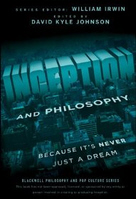Note that the book itself contains 22 separate essays by different authors. This is part of the final one by Tyler Shores. Paradox, Creation, and Memory Inception is very much about the things the mind creates, ranging from fantastic, physics-bending displays of cityscapes folding on top of themselves to Cobb's guilt-driven projections of Mal. Cobb describes dream-building as "the chance to build cathedrals, entire cities, things that never existed, things that couldn't exist in the real world." Of course, we build dreams ourselves, but examining how we do so gives rise to yet more loops, and more paradox. 
During one of the more provocative exchanges in the film, Cobb and Ariadne discuss the mechanics of creating a dream world, in which invention and discovery somehow become simultaneous operations. The idea of creating and perceiving something simultaneously seems paradoxical — especially if that perception is discovery. How can I discover something that I myself created? How, if I am creating my dream, can I be surprised by parts of it, and not know what will happen next? As Cobb sketches this idea—two curved arrows, pointing at each other's non-pointed ends—perceiving begets creation, which in turn feeds back into more creative ways of perceiving, and so on. Can the mind be both the subject (perceiving that which it creates) and object (creating the thing that it is perceiving) at the same time? Instead of being a paradox, perhaps this merely suggests that creation is less like a linear process of getting from one point to another, and instead is more like a feedback loop. In Inception, characters are able to experience the contents of their dream experiences as they happen. For our own (non-lucid) dreaming experiences, we can only experience our dreams as remembered events when awake. In the film, Cobb blurs that line between the contents of memories and created ideas, which, as we find out, spells trouble.
|
|||
|
|||


www.advaita.org.uk
Advaita for the 21st Century



Book Extract
Inception and Philosophy
Ed. David Kyle Johnson

Tyler Shores is a writer and received his Master’s Degree from the University of Oxford. Tyler received his B.A. in English and Rhetoric from the University of California, Berkeley. He is a contributor to several books in the Blackwell Popular Culture and Philosophy book series.
Website: http://www.tylershores.com/
Biography
BOOK DETAILS
Publisher: John Wiley and Sons
ISBN: 978-1-118-07263-9
Format : Paperback
Pages: 386
List Price: £11.99, US$17.95
Where to Buy
AUTHOR DETAILS

